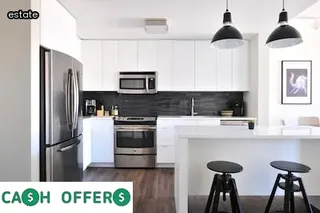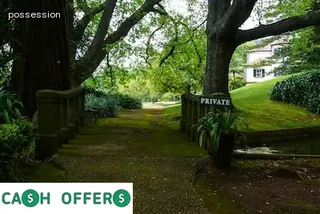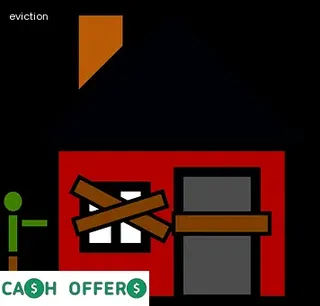Adverse possession, also known as squatter’s rights, is a set of laws that govern the acquisition of property through extended and exclusive occupancy. In South Dakota, adverse possession laws allow individuals to gain title to land they have occupied for an extended period of time without any legal right to do so.
Adverse possession has four elements: open and notorious occupation, actual possession, exclusive possession, and continuous possession. In South Dakota, the duration of open and notorious occupation must be at least seven years in order to claim title by adverse possession.
This means that if someone occupies a parcel of land for seven years or more without permission from the rightful owner and meets all other conditions stated under South Dakota’s adverse possession laws, then they may be eligible to acquire title to the property. Additionally, it is essential that claimants pay all applicable taxes on the property during their occupancy in order to qualify for title acquisition through this route.
Understanding how these laws work is essential for anyone interested in claiming title to a piece of real estate in South Dakota through squatting or adverse possession.

To legally claim adverse possession in South Dakota, the squatter must meet certain requirements. All squatters must have been in exclusive physical possession of the property for a period of at least 20 years.
The land must be occupied continuously, with no interruptions or gaps. The squatter must also pay all taxes and assessments on the property that have come due during the time they were occupying it.
Additionally, it must be clear that the squatter has acted as if they owned the land and had an intention to possess it permanently. This includes displaying typical behavior like mowing the lawn, making repairs to buildings on the land, or otherwise tending to it as if they owned it.
While this is not necessary for legal possession to occur, it could help in establishing a stronger legal claim.
In South Dakota, squatters' rights are a complex legal issue that homeowners must be aware of in order to protect their property from trespassers. It is important to understand the laws related to squatting and how to prevent it from occurring on your property.
In order for you as the homeowner to avoid squatters legally owning your property, it is important to take certain legal steps such as posting "No Trespassing" signs and preventing access to your property. Additionally, if a squatter does gain access, you should take immediate action by filing a complaint with law enforcement or taking the squatter to court.
Furthermore, it is important to verify any tenant's identity before renting out or leasing your home or property. Finally, if you suspect that someone may be living on your land without permission, contact an attorney who specializes in real estate law in South Dakota for further guidance.

When it comes to the pros and cons of allowing partial property possession in South Dakota's housing market for squatters, it can be a complex issue. On one hand, squatting can provide an opportunity for homeless people to have shelter and basic necessities.
This can ease the burden on other social services and provide a viable option for people who may not qualify for or be able to afford traditional housing. On the other hand, there is a risk that squatters who are allowed to partially possess property may not take adequate care of the building or its surrounding area, leading to property damage or destruction.
In addition, laws that allow partial possession could give rise to an increase in crime in certain areas as some individuals may be tempted to take advantage of this legal loophole. Ultimately, these are factors that need careful consideration before any policy is adopted.
The Color of Title doctrine is an important legal concept to understand when discussing squatters rights in South Dakota's housing market. This doctrine states that if a person occupies property and has made improvements to it, they may be able to establish a claim of ownership if they can prove that they paid taxes on the property, held it openly and notoriously, and have been in continuous possession for at least ten years.
This is often referred to as "adverse possession," and while this principle applies in all fifty states, South Dakota has some unique statutes regarding residential properties. In particular, individuals who occupy real estate with the expectation that they will eventually acquire title must meet certain conditions for their claim of ownership to be considered valid.
These include a written agreement between the parties detailing their respective rights, the payment of taxes and other fees related to the property, and a good faith intention by both parties to abide by their agreement. With all these considerations in mind, understanding the Color of Title doctrine is essential when examining issues relating to squatters rights in South Dakota's housing market.

Squatting in South Dakota can be a risky endeavor; many individuals are unaware of the legal implications associated with squatting on someone else's property. It is essential to understand the local laws and regulations before attempting to squat in the state, as they vary from place to place.
Potential risks of squatting in South Dakota include civil liability for trespassing, criminal penalties for the same, and eviction by the rightful property owner. In some cases, there may even be potential criminal charges such as burglary or larceny if an individual moves into a vacant home with no legal rights to do so.
Furthermore, squatters may not be able to gain access to much-needed services such as utilities or public transportation due to their lack of official residence status. It is important for individuals considering squatting in South Dakota to weigh all potential risks before entering a living arrangement that could have far-reaching consequences if not done properly.
When it comes to squatters' rights in South Dakota, one of the most common questions is whether there is an expiration date. Generally speaking, a squatter's rights in South Dakota doesn't have a fixed time limit and can last for years if the squatter continues to possess and occupy the property.
The state of South Dakota does not have any specific legal statutes or regulations dealing with squatters' rights, so this issue is typically handled on an individual basis. In order to ensure that a squatter's rights are valid and protected, it is important for them to adhere to certain criteria such as paying taxes, maintaining the property in a safe condition, and staying within city limits.
It is essential for anyone looking into squatting in South Dakota to research all relevant laws before taking action. Additionally, squatters should be aware that their rights could potentially be challenged by the rightful owners of the property at any point.

In South Dakota, it is important for property owners to understand the financial implications of having a squatter on their property. Squatters are not legally considered tenants and are therefore not subject to the same protections or rights as those who rent or own a home.
This means that homeowners must take extra steps in order to protect themselves from any potential liabilities or costs associated with squatters. In some cases, having a squatter on the property may result in legal fees and other related costs, such as damages that need to be repaired.
Additionally, if a squatter doesn’t leave when asked, homeowners may have to go through the eviction process which can also come with additional costs and time-consuming paperwork. Furthermore, if squatters cause damage to the premises during their stay, it is likely that the homeowner will be responsible for repairing such damages; this expense should also be taken into consideration when assessing the financial implications of having a squatter on one’s property.
Lastly, it could potentially be difficult for landlords and homeowners to rent out or resell their properties if squatters remain living there without proper documentation or permission.
When a homeowner discovers a squatter living on their property, eviction is not the only option. There are alternatives that can be explored to achieve a successful resolution for both parties involved.
One of the most common options is for the homeowner to offer the squatter a lease agreement which provides them with legal rights and responsibilities as a tenant. This arrangement must meet all local and state laws in order to be legally binding and must also be mutually agreed upon by all parties.
Another alternative is for the homeowner to negotiate an arrangement with the squatter in which they will provide services or goods in exchange for continuing occupancy of the property. This can include landscaping, painting, yardwork or other tasks needed around the home.
Lastly, if all else fails, homeowners may need to consider taking legal action against the squatter such as filing an unlawful detainer lawsuit in order to have them removed from their property. All of these alternatives should be considered before attempting to evict a squatter from your home and any decisions should always comply with South Dakota's housing market regulations and squatters rights laws.

When discussing squatters rights, it is important to understand the differences between states. Adverse possession laws vary from state to state, and South Dakota is no exception.
In South Dakota, a squatter may gain legal title to a property after living in it for seven years. The squatter must openly occupy the property and pay all applicable taxes during this period of time.
Additionally, the squatter must have an intent to possess the land and make improvements on it. This means that if someone is simply camping on another person's land without permission or any intention of claiming ownership, they cannot use adverse possession in South Dakota as a way to gain legal title.
It is also important to note that certain types of properties are not eligible for adverse possession in South Dakota, such as churches or public lands. Understanding these laws can help landowners protect their interests and potential squatters determine whether or not their situation allows for adverse possession claims in South Dakota's housing market.
In South Dakota, a squatter is legally defined as someone who occupies a property without the permission of the legal owner. This individual has no legal lease or title to the property but still has rights as an occupant.
Squatters in South Dakota have rights to possession and occupancy of a home under certain circumstances. In most cases, these rights are established when an individual takes up residence in a dwelling for a continuous period of time that meets the state's definition for squatting.
This typically requires having lived on the property for at least three months, paying rent or utility bills, and having made some improvements to the property. It is important to note that squatters cannot claim ownership of the property by simply occupying it over the required time frame.
However, they do have certain protections under state law which can be useful if they ever find themselves in need of legal assistance.

In South Dakota, it is important to understand your rights as a homeowner when it comes to protecting yourself from unwanted encroachment. Squatters' rights are another way of referring to adverse possession, which is the legal process in which someone gains ownership of a piece of property by occupying and taking control over it for an extended period of time.
This guide will offer insight into how squatters' rights work in South Dakota's housing market, so that you can take the necessary precautions to protect your property from unwelcome intruders. In order to establish adverse possession in South Dakota, the squatter must occupy the land openly and continuously for a period of twenty years or more, while paying all taxes due on the property during that time.
The squatter must also have a good faith belief that they own the property and must have taken steps to improve or maintain it throughout their occupancy. It is important, however, that you as a homeowner are aware of any potential squatters on your land and that you take steps to prevent them from establishing any form of ownership over your property.
To do this, you should be familiar with local laws concerning squatting and make sure to inform anyone occupying your land that they do not have permission or authority to stay there. Additionally, if you suspect any unauthorized use of your property, contact law enforcement immediately.
When squatting in South Dakota, it is important to understand the tax obligations that come with it. According to state law, squatters must pay property taxes on the land they occupy, even if they do not legally own it.
Although this may seem unfair or unjust, it is an essential part of protecting the rights of all parties involved in a housing dispute and ensuring that the state's resources are being used responsibly. Additionally, squatters should be aware of any local regulations that may apply to their situation - such as laws about renting or leasing - and comply with them accordingly.
Furthermore, squatters cannot deduct the cost of occupying or maintaining a particular piece of property from their taxes. Lastly, those who live in public housing projects should also be aware of potential occupancy fees or other costs associated with living in these dwellings.
Knowledge of these obligations is key to understanding one's rights as a squatter in South Dakota and avoiding costly penalties.

In South Dakota, adverse possession is a legal process through which lost land may be reclaimed. This is often referred to as squatter's rights.
To establish a claim for adverse possession in South Dakota, the claimant must meet certain requirements such as having an open and notorious possession of the property for a period of at least five years and paying any taxes or other assessments levied against the property. Additionally, they must demonstrate that they have made improvements to the property and that their possession was hostile and exclusive to all others.
In some cases, they may also be required to prove that they had a good faith belief that they were the rightful owner of the property. The court will ultimately decide whether or not a successful claim has been made based on these criteria.
Furthermore, it should be noted that if an individual obtains title to land via adverse possession, then all prior owners lose title to the property which can have unintended consequences for those who are unaware of this law.
Squatters' rights in South Dakota have been a source of confusion for many people. While it is true that inhabitants of a property who have lived there for an extended period of time may be able to claim legal rights to the property, the situation is actually more complicated than many assume.
For example, squatters typically must meet certain criteria in order to gain rights. In South Dakota this includes having permission from the landlord or paying rent, as well as living in the residence openly and continuously for a certain amount of time.
Additionally, filing paperwork with the local court system within a certain timeframe is also required. Furthermore, even if these criteria are met, squatters' rights are limited and do not convey full ownership of the property.
Instead, they provide limited protection against eviction and other issues related to tenancy.

If you cannot afford home or car insurance in South Dakota, there are still options available to you. One of the most common is to become a squatter.
Squatting means living in an uninhabited property without the permission of the owner and while squatting laws vary from state-to-state, South Dakota has laws that protect squatters in certain circumstances. Additionally, if you're looking for an affordable place to live, Idaho's cost of living is slightly lower than many other parts of the US, meaning you could potentially enjoy a higher quality lifestyle for less money.
Before making any decisions about moving to Idaho or becoming a squatter in South Dakota, however, it's important to do your research and understand your rights so that you can make sure you're making an informed decision that fits with your current financial situation.
When it comes to establishing an easement with a squatter, South Dakota's housing market presents its own unique set of challenges. To begin, it is important to understand the concept of adverse possession as defined by the state.
This legal doctrine states that if an individual occupies another person's property continuously for a certain period of time, they can gain title to that property. The length of time is determined by the laws in each state, and in South Dakota, it is 20 years.
Before this period has passed, establishing an easement with a squatter may be possible depending on their rights under current law and local regulations. It is also possible to negotiate an agreement between both parties outside of the court system.
Depending on the situation, it may be beneficial for both parties to reach an agreement as opposed to simply relying on statutory law. However, if this fails or is not feasible, then proceeding through the court system may be necessary in order to establish any kind of contractual arrangement regarding access and use of the land.
Additionally, individuals should be aware that squatters' rights do not always guarantee full ownership rights over a particular piece of property despite having occupied it for many years; thus, any agreements made during negotiations should take these limits into account.

When it comes to dealing with squatters on your property, it is important to understand the rights and responsibilities of both the squatter and the landlord. In general, squatter's rights in South Dakota are much like those of other states in that they must adhere to certain rules including providing a minimum amount of notice before leaving, notifying the landlord of their presence, and ensuring that they do not cause any damage to the property.
Additionally, if you are negotiating a settlement with a squatter on your property, it is important to be aware that there may be legal implications for both parties involved. For instance, squatters who fail to abide by the terms of their agreement may face eviction or even criminal charges.
On the other hand, landlords should also be aware that if an agreement is reached but not adhered to by either party then they could potentially be held responsible for any damages caused by the squatter. It is therefore important for both parties to thoroughly understand all aspects of their agreement before entering into a settlement.
Dealing with squatters can be a difficult and costly endeavor, especially in South Dakota's housing market. To avoid costly litigation when dealing with squatters, it is important to understand the relevant laws and regulations governing them.
It is also important to stay up-to-date on any changes that may affect your rights as a landlord or homeowner. Additionally, it is wise to consult an experienced attorney who specializes in this area of law before taking any action to remove a squatter from your property.
Furthermore, it is often beneficial to first attempt informal negotiation with the squatter before resorting to legal action. If the squatter has established residency on the property, you will likely need a court order for eviction; however, if they are merely trespassing on your property, you may be able to have them removed without legal intervention.
Finally, while not legally required, it may be beneficial to offer some form of compensation or other incentive to encourage the squatter to leave voluntarily. Understanding these strategies and tips can help ensure landlords and homeowners avoid costly litigation when dealing with squatters in South Dakota's housing market.
In South Dakota, squatter laws are in place to protect the rights of those individuals who have been living in a residence without permission or legal right. Squatters, also known as "adverse possessors," are people who have taken up residence in a home or other property that they do not own or have any legal right to occupy.
According to South Dakota’s squatter law, if an individual has occupied a residence for at least seven years and has paid all taxes due on the property during that period, they may be able to claim legal ownership of the property. Additionally, squatters must provide proof of occupancy by showing that they have made improvements to the property, such as making repairs or paying utility bills.
In order for a squatter to legally gain title to the property, two elements must be met: possession and payment of taxes. If these elements are satisfied, then the squatter may be eligible for title under South Dakota law.
It is important for individuals looking to gain ownership over a particular piece of real estate through adverse possession to understand South Dakota's laws and regulations before taking action. A comprehensive guide on squatter rights in South Dakota's housing market can provide valuable information and insight into the different types of squatters rights available throughout the state.

Adverse possession, also known as squatter's rights, is a legal concept that allows an individual to gain title of another person's real property through certain requirements. In South Dakota, a person must occupy and possess the property continuously for at least 20 years to be eligible to claim adverse possession.
The claimant must use the property openly and notoriously as if they owned it and pay all applicable taxes on the land in their name. Additionally, the occupier cannot have permission from the true owner or any other legal rights to possess the property.
If all of these criteria are met, then an adverse possessor may be able to acquire legal title of the land after filing a quiet title action against the true owner in court.
Are squatters rights OK? Squatters rights refer to the legal principle that allows a person, who has taken possession of property without permission from the owner, to acquire legal title after occupying it for a certain period of time. In South Dakota, squatters are protected by specific laws and regulations as defined in Title 43-32 of the South Dakota Codified Laws.
This comprehensive guide will provide an overview of these rules and regulations in order to help those interested in occupying an abandoned property understand their rights. In South Dakota, if a squatter occupies an abandoned property for seven years or more they can acquire legal title over the property.
While this may seem like a long period of time, squatters must also satisfy other requirements such as paying all taxes associated with the property, maintaining possession through continued occupation and use and filing a Declaration of Adverse Possession with the court system. Furthermore, if squatters fail to meet any one of these criteria they may lose their right to claim ownership over the property.
Therefore it is important that those interested in taking advantage of squatter’s rights become familiar with all applicable state laws before attempting to take possession or title over an abandoned building or land. For those looking to legally occupy an abandoned property in South Dakota, understanding the rules and regulations surrounding squatter’s rights is essential for successfully doing so.
If you are a landlord in South Dakota's housing market, chances are you have had to deal with squatters on Airbnb. Although it is not easy, there are some steps that can be taken to stop squatters from taking over your property.
The first step is to properly screen tenants before they move in. Make sure to ask for proof of identity and income, as well as references from previous landlords.
Additionally, set up a lease agreement that clearly defines the terms of occupancy, including the duration of tenancy and any applicable fees or penalties for breaking the lease. Secondly, it is important to be aware of local laws related to squatting so that you can take appropriate legal action if necessary.
In South Dakota, there are specific regulations regarding landlord-tenant rights and regulations related to evicting squatters from your property. Finally, it is essential to educate yourself about the eviction process in order to ensure that all procedures are followed correctly and that any disputes with tenants or squatters can be handled quickly and efficiently.
With these tips in mind, landlords in South Dakota's housing market can protect their properties from potential squatters on Airbnb.
A: In South Dakota, a landlord and tenant may establish an oral or written agreement that outlines the terms of a month-to-month tenancy. If no such agreement is made, then the landlord is allowed to terminate the tenancy with 30 days' notice. The tenant must also provide 30 days' notice before terminating the lease. Squatters do not have any rights under these agreements.